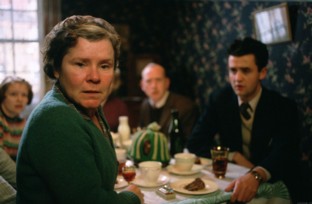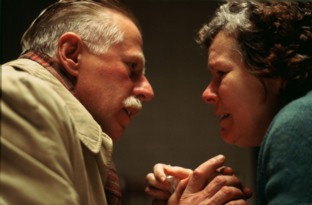|
Certain
human experiences cry out for subtext and allegory when depicted
in movies. Sally Bowles (the magnificent Liza Minelli in Cabaret)
has decided against becoming a mother. Resplendent in an absurdly
expensive fur coat, she climbs the steps of (presumably) the
freelance man or woman who can assist her in delaying motherhood.
Even more euphemistically a child's ball bounces down the
steps - a childhood denied? Sally emerges, fur-coatless, cold
and now one assumes, soon to be bereft of the growing life
within her. This was a tiny part of Cabaret's
narrative. It is the spine of Mike Leigh's latest multi-BAFTA
nominated low budget master-class in screen acting and deceptively
simple narrative. I think Mike Leigh and Harvey Weinstein
really ought to take a meeting. And then I think Mike should
decline any offer and have a serious word with Scorsese.
Abortion,
by its own or any other name, does not normally align itself
with box office gold. This is why we need outsiders like Mike
Leigh. A film with no discernible 'inciting incident' and
subsequent three-act structure does not ache to play well
in world multiplexing itself into homogenisation. This is
why we need Mike Leigh. This is a cinema experience with one
laugh, many smiles but mostly it illustrates a grim working
class life in post war London. It's late 1950 and the alien
world that Britons enjoyed after the war is only alien to
us now because, despite the news, we have moved on. Reminding
us of this is Mike Leigh. That is why we need Mike Leigh.
Vera
Drake is an extraordinary film for its mere, albeit celebrated,
ordinariness. A middle-aged woman is a social rock in her
community helping everyone needing help. Her car mechanic
husband toils honestly by day while her spiv-like but devoted
son and her round-shouldered and chronically shy daughter
are good natured fixtures of home life. Lillie, a friend and
in effect Vera's 'pimp', is making very good money exploiting
Vera's talents as a morally inspired guardian of young
women's lives. She does what someone once did for her. She
performs abortions, 'helping out' young women. She is caught,
tried and sentenced. There is no 'movie' character arc. There
is no audience-pleasing last minute melodramatic twist. There
is a woman believing herself to be doing good in a world where
that good is simply unlawful, like not believing in God in
the 17th century (where without appeal, you got executed unless
you could prove you were really unwell). Haven't we
come on!

We
live in a country where the law is often proved albeit inconclusively
to be an ass. As human beings, we get ourselves into situations
that the law cannot apply itself to or the current laws do
not know how to interpret certain actions and therefore with
no precedents, the law either harshly punishes or leniently
discharges. There is a law against suicide here in the UK.
Let that sink in. Kill yourself and you're in a world of trouble…
Are there lawyers in heaven? I should think not. The practical
reality of this would make trying those cases particularly
unpleasant. But top of the moral agenda in Mike Leigh's fascinating Vera Drake is not the question of whether
she should 'help the young women' or not. The abortion debate
is not fuelled by the movie. I would imagine, given all sorts
of different personal circumstances, we all have our singular
opinions. But Vera Drake is not about moral
choices. It's about the disintegration of a family based on
choices made by the lead character. And possibly even above
that, it's about a culture, a human society based on rules,
class divides and cups of tea, miraculous healing liquids
that seem to attend to any ill.
This
is a world (a very real one lived in by a sizeable proportion
of those still alive today) in which certain truths were self-evident.
Forgive me if this list offends but in 1950 they were undeniably
true.
- Women cooked, cleaned and looked after men's domestic
needs.
- Men worked at 'proper' jobs and a percentage
of their pay was named 'housekeeping'.
- Men asked girl's fathers for permission to marry.
- Men and women knew their place.
- EVERYONE seemed to smoke.
- NO-ONE seemed to be particularly well educated
when it came to unwanted pregnancies...
And
worst of all you were judged constantly by your behaviour,
the cleanliness of your home, the success of your offspring
and the perceived common wisdom of decorum being more important
than happiness. It is this groundswell of opinion that Vera
falls foul of. Despite her loving family's support (even the
rigidly black and white espousing son comes to forgive his
mother), Vera is thrust into a post-arrest world where things
are black and white and no ghosts from the past will stand
up and acknowledge that her actions saved lives, lives living
rather than the organic spark just brought into being destined
to be plunged into misery because of certain circumstances.
We
are spared very little (gynaecologically speaking Vera
Drake is not explicit but the acting is so good
across the board that it may as well be) and the business
of home termination is presented as matter of factly as a
kettle boiling (the first procedure incidentally). Vera remains
curiously aloof from her emotionally wrought patients. Imelda
Staunton (whose movie this is as she dominates, giving her
all to this pathetic creature) is a benevolent aunt who knows
why these girls cannot afford in every sense to have a child.
She wants to, almost desperately needs to, offer more but
knows the role of fairy godmother well. She wafts in, pinny
on, does the job, explains in simple terms what will happen
next and reluctantly disappears letting the emotional impact
of her actions sink in.

Leigh
is never without social comment. In a clever piece of screenwriting,
Vera's sister-in-law is harassing her husband for a
£35 pound washing machine (high tech in 1950, one assumes
so now we know the value of 1950's £35). In a parallel
story line (which does not touch Vera's story at all only
to offer 'the other side' so to speak), we meet Miss Wells,
a fragile upper middle class girl who is raped in a scene
that should be hard to watch - it is. Sally Hawkins' performance
(as Susan Wells) is as strong in a supporting role as any
nominated actress this year. Of course she falls pregnant
and goes the 'official' monied way - doctor first, specialist
next (who offers his service for a staggering 200 guineas
after asking for £250 - that's over seven washing machines
and 125 times what Vera's 'fixer' charges). And eventually
she is forced to see a psychiatrist. This is a world where
the mere thought of such a dark and self-defeating route to
good health was met with severe social opprobrium. The psychiatrist,
in a dimly lit, old fashioned study, places his fingers in
a steeple thrust out in front of him appearing as a steam
train with a cow buffer should any of the unreal madness he
encounters actually make contact with him. He is as sympathetic
as a bullet. Miss Wells' predicament is certainly different
by simple expedient of class. What she is paying through the
nose for, Vera does for nothing.
It's
only when one of the hundreds she has helped shows complications
causing her admittance to hospital and a brush with death,
does the law very easily close in. At the happiest double
celebration for the Drakes, the inspector calls. It is when
Vera's world collapses that Staunton grasps this simple movie
and shakes it raw. By the sheer power of the close up (an
actor's secret weapon so sparingly applied in the previous
hour and ten minutes) Staunton gives us an intimate and powerful
study of disintegration. Here is a woman who cannot live in
'their' world, the world of suffering for the sake of law
and polarised moral conscience. Her family, naturally, are
dumbstruck and the hurt and confusion etched on these characters'
faces is never questioned. Their authenticity is beyond reproach.
For
all the apparent simplicity of Leigh's script and direction,
he is anchoring us to the world of the real (in dramatic terms)
in very subtle ways. Vera lives in small rooms and enclosed
spaces make up a large percentage of her domestic life. When
she's in open and airy and light spaces, she's on her knees
scrubbing floors… Leigh's camera movements are minimal
and necessary when employed, his editing, invisible, his (and
by implication his crew's) craft, impeccable.
In
1996 I was lucky enough to attend the BAFTA Craft awards and
was there to see Leigh accept his 1995 Michael Balcon Award
for Outstanding British Contribution to Cinema. (He had been
nominated twice before (in '92 for the short A Sense
of History and in the following year, Naked was nominated for the Alexander Korda award). I do not have
a copy of his speech in front of me and can only paraphrase.
Leigh accepted graciously and remarked that despite his pleasure
of receiving this prestigious award, he was a little mystified
that none of his technicians, producers or actors had ever
won a BAFTA on one his films… It was a gentle nip at
the claw that feeds him but once again, that is why we need
Mike Leigh.
Secrets
and Lies won the Alexander Korda BAFTA Award the following year. Don't
you love politics?
|